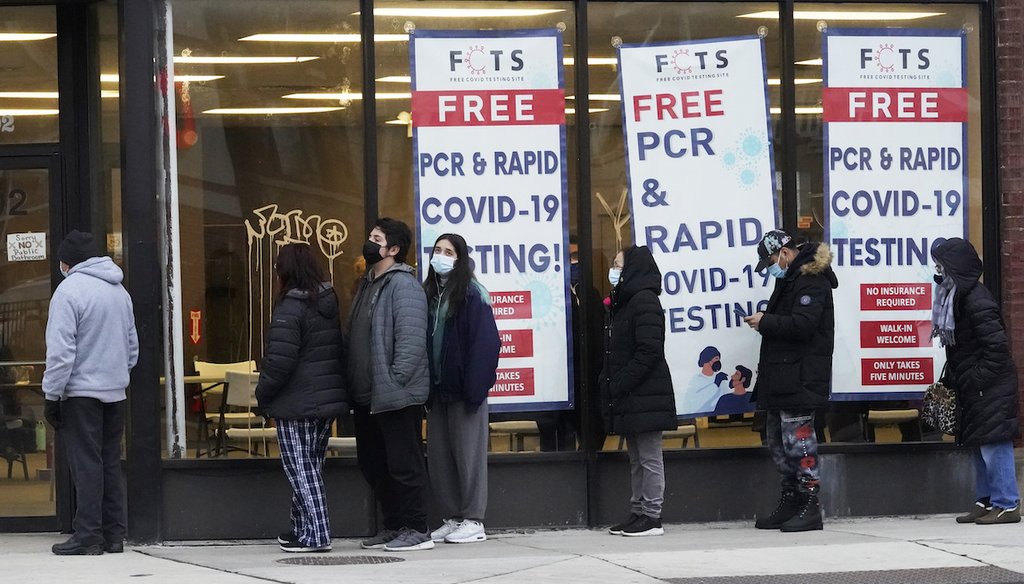

Our only agenda is to publish the truth so you can be an informed participant in democracy.
We need your help.


People line up to take a COVID-19 test at a free PCR and rapid testing site in Chicago on Dec. 30, 2021. (AP)
Johns Hopkins researchers developed microdevices known as "theragrippers" that were designed to "latch onto intestinal mucosa and release drugs into the body" over an extended period of time. But they are not being used for vaccine delivery, a spokesperson said.
The devices have been tested in rats, but are not approved for use in humans.
Nasal swabs are a staple of COVID-19 testing, but some social media posts claim you should be skeptical of exactly what’s on your swab.
"Johns Hopkins University confirms: You can be vaccinated with a PCR test, even without knowing," read the headline of a newsletter being shared on Facebook.
The newsletter went on to claim that the push for widespread PCR COVID-19 testing might be "a WHO vaccination program in disguise." It alleged that new technology developed at Johns Hopkins University "is supposed to make it possible to carry out covert vaccinations through a PCR test."
Posts sharing the newsletter were flagged as part of Facebook’s efforts to combat false news and misinformation on its News Feed. (Read more about our partnership with Facebook.)
There is no evidence that researchers affiliated with Johns Hopkins University have said people can be vaccinated with a PCR test.
A polymerase chain reaction — or PCR — COVID-19 test detects genetic material from the virus, according to the Cleveland Clinic. To conduct a PCR test, a swab is used to collect a sample of the respiratory material found in a person’s nose. The sample is then tested for coronavirus genetic material.
The newsletter falsely suggested that tiny devices developed by Johns Hopkins researchers known as "theragrippers" can be added to the PCR test swabs to vaccinate a person without their knowledge.
Theragrippers actually exist, but there is no evidence they’re being used for "covert vaccinations," and they’re not administered by cotton swabs, as the newsletter suggests. The newsletter points to a November 2020 Johns Hopkins article that said that researchers had designed and tested "tiny, star-shaped microdevices that can latch onto intestinal mucosa and release drugs into the body."
A spokesperson for Johns Hopkins Medicine said articles about the research have been "inaccurately used for disinformation purposes" in recent months.
"The article described small devices known as ‘theragrippers’ that are deployed to the intestines via an endoscope," the spokesperson said. "When these dust-sized devices reach a certain temperature, they latch onto tissue and release the medicine that has been loaded onto them."
Research into how the devices might be used to improve gastrointestinal tract extended-release drug delivery was published in the journal Science Advances in October 2020.
"The researchers demonstrated that the theragrippers were capable of clinging to the GI tracts of live rats for 24 hours" and found that the devices helped a pain reliever "remain in the body for a substantially longer period of time," according to Science Advances.
The research found that "self-latching microdevices enhance the efficacy of extended drug delivery."
The newsletter highlights the role of swabs, suggesting that PCR swabs with theragrippers could vaccinate people without their knowledge. But theragrippers are not administered via such swabs.
"Theragrippers can be endoscopically deployed in the GI tract," explained an article Johns Hopkins Medicine released in February 2021.
The newsletter misleadingly relies on a photo from the original November 2020 Johns Hopkins article. To emphasize the small size of the technology, the university featured an image of a swab dotted with black specks.
"A theragripper is about the size of a speck of dust," the photo caption said. "This swab contains dozens of the tiny devices."
The Johns Hopkins Medicine spokesperson said that the theragrippers have "shown promise in a laboratory setting," but the technology is still in the early stages and has not been approved for use in humans.
The spokesperson said that theragrippers have not been tested or used for vaccine delivery.
Claims about theragrippers being used for COVID-19 vaccinations have been circulating since at least April 2021, and they have been debunked repeatedly.
Facebook posts shared the headline: "Johns Hopkins University confirms: You can be vaccinated with a PCR test, even without knowing."
Johns Hopkins researchers developed nanotechnology called theragrippers, which could improve gastrointestinal tract extended release drug delivery. The technology has been tested in live rats and has not been approved for use in humans.
Theragrippers are not administered by cotton swabs, and they aren’t being used for vaccine delivery, a spokesperson said.
We rate this claim False.
Johns Hopkins University, "Johns Hopkins researchers take inspiration from parasitic work for medicine delivery," Nov. 25, 2020
Johns Hopkins Medicine, "Johns Hopkins Develops Tiny Machines That Deliver Medicine to the Intestines," Feb. 15, 2021
Science Advances, "Gastrointestinal-resident, shape-changing microdevices extend drug release in vivo," Oct. 28, 2020
Science Advances, "Science Advances Volume 6, Issue 44," Oct. 30, 2020
Email exchange with Caslon Hatch, a Johns Hopkins communications specialist, Feb. 15, 2022
Cleveland Clinic, "COVID-19 and PCR Testing," accessed Feb. 16, 2022
USA Today, "Fact check: COVID-19 PCR test created to detect infection, not vaccinate," Oct. 15, 2021
Reuters, "Fact Check-Johns Hopkins University did not say that you can be vaccinated with a PCR test," June 16, 2021
Associated Press, "Posts distort research details to suggest secret vaccine campaign," Feb. 16, 2022
In a world of wild talk and fake news, help us stand up for the facts.
